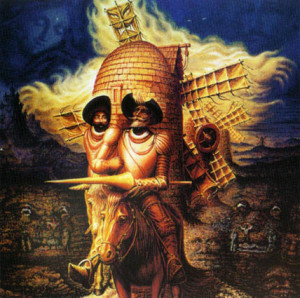I see what’s going on. I know what Cervantes is doing.
But before all that, I must say that the book club did not meet last Tuesday. A couple members were not able to make it and some had yet to finish reading. However, we plan to meet next Tuesday to discuss the hundred pages still uncovered.
We’re going to go a little bit against normal formatting. Usually, I include a few conventional paragraphs in my posts (you know, paragraphs that have a topic sentence, lead in, quote, and analysis) but this time we’re going straight blog. I write conventional paragraphs because I want to show that I can walk the walk and talk the talk. Plus, I want to keep exercising my writing skills because writing is like every other activity in the world: the more we practice the better we get, and if you don’t use it you lose it.
So, with that said, this post can be looked at in a way that resembles a curious rambling. Not much is happening right now in our narrative. I would be lying if I said I was more than thrilled with every page. In fact, I found myself yawning, finding it extremely difficult to stay attentive and engaged with the text.
Last time, we discussed truth in fiction and truth in events that take place in reality. Certainly meaning can be found in both, but the debate consists in which of the two mentioned is more true. This in the novel is instantly followed by a frame tale of a man who is recklessly curious of his new wife. The man tests his wife to see if she is absolutely virtuous and sets up a plan to ruin him, her, and his best friend. Of course this is all done unintentionally. Nevertheless the narrative concludes after a few long chapters, and the priest finds nothing wrong with the narrative other than it was told in such a way that fails to indicate if the events were true, as in they really happened.
This was the beginning of this reading. The very next thing to happen was a company of men, 4 to be exact, arrive at the inn in which the narrative is currently set. With the four men, there is a swooning woman who does nothing but sleep. Lo and behold it is Don Fernando, his squire’s, and Lucinda. This is strange. Having just read a narrative where the narrative could not be ruled true, there happens to be a seemingly impossible occurrence where the unfortunate people of the inn are met by the man who caused them their misfortune. What are the odds?
Let me make the implications of this very clear. In the narrative, we have characters trying to decide what best accompanies truth in words, i.e. account of true events or made up ones, then they encounter an event that seems unbelievable. That the very man, Don Fernando, arrives at the inn, which the people he had harmed were staying, who had a team of people including Don Quixote, to right the wrongs committed. To make a long story short, Don Fernando returns his affection to his original wife Dorotea, and Cardenio is reunited with Lucinda.
Next, two people arrive at the inn. A Christian travelling with a Moorish woman. Now I don’t know if you know because I certainly didn’t know, that Spain hated the Moor’s. They were considered natural enemies like a seal and a shark (I wish I had a better simile that fit the landscape). It was said that this woman was so beautiful that it would have been hard to compare her if it were not for Lucinda and Dorotea having already been there. Everyone makes friends and they sit down to dinner.
The next few chapters, seemed absolutely pointless. Don Quixote rambled on and on about the valor arms and letters, and he discussed which ones were more noble and went into length as to why they were so. I found this deeply irritating and wish to continue to another part which I was also deeply irritated on a profound level.
The man who arrived with the Moor had been a Captive and is referred as such. At the beginning of chapter XXIX, titled In which the captive recounts his life and adventures, with a footnote. My first thought was, No, not another tale of a man’s life story!!! Then I looked at the footnote and totally confirmed in my fear. The footnote says that this chapter and apparently the ones following it was the second of the interpolated novels. Here we go.
The captive begins his tale, which is interesting because it tells of his father’s history. A man of great fortune and wealth decided to give his son’s money for their future. There were three son’s and each took up a different field their father felt and believed to be the most prosperous. Our narrator took up arms. After this, we get a down pour of political alliances and world history that I can not even begin to recount because I don’t fully comprehend exactly what took place, nor do I care.
These were tough pages and I finally found relief when the man in some sort of prison yard is picked to be a husband by this maiden in a window, who wishes to be a christian. This woman wants to escape. And our narrator does so.
The way the events unfold in his tale are awfully curious to me. The reason why is because everything that happens to them that could go either good or bad, goes good. Everything works in their favor. This is a little suspicious to me. So I am looking out. It seems odd because we have a fictional story inside a fictional story and people are wondering if it’s true. Then we have a true story in a fictional story, however this story seems far from true the way everything happens in the captive’s favor, and yet everyone believes him. And the big kicker is that while everything goes right for everyone else, everything for our great Don Quixote of the Mancha, Knight of the Sorrowful Face, goes absolutely wrong. He’s like the good luck charm that exudes misfortune for him, having the opposite effect on everyone around him. Very odd Cervantes, very odd indeed. I’ll keep my eye on you…

